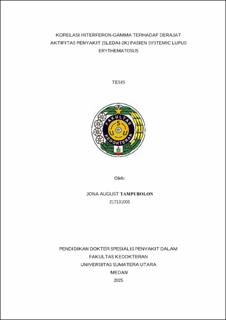| dc.description.abstract | Background: SLE is a chronic autoimmune disease that results in organ damage
with variable clinical presentations. The high morbidity and mortality of patients
is related to the increasing degree of disease activity. Interferon signalling
pathway (IFN-inducile genes) is activated in SLE cases, but its role in increasing
the degree of SLE disease activity remains unclear. The purpose of this study was
to determine the correlation of IFN gamma to the increase in the degree of
activity.
Methods: This study used a cross-sectional design conducted for 6 months at H.
Adam Malik Hospital Medan by fulfilling the inclusion and exclusion criteria.
Data collected included patient's clinical manifestations, SLEDAI score, IFNgamma
level examination. The role of IFN gamma on the degree of disease
activity was analysed with a correlation test to determine the linearity and strength
of the correlation, statistically significant if the p value was <0.05.
Results: The study subjects obtained were 67 patients, the majority were female
with a ratio of 9:1 and the mean age of the subjects was 35 years, the highest
degree of disease activity was moderate 41.8%, the median SDI organ damage
score was 1, and the median IFN-gamma level was 31.16 pg/mL. The mean
interferon gamma level increased with the degree of disease activity, namely
remission (39.48 ± 28.65), mild (93.49 ± 105.5), moderate (200.55 ± 374), and
severe (208.84 ± 336), but there was no statistically significant correlation
between IFN-gamma and the degree of disease activity (SLEDAI) (r + 0.055; p
0.659).
Conclusion: Interferon-gamma levels do not correlate with disease severity. | en_US |


